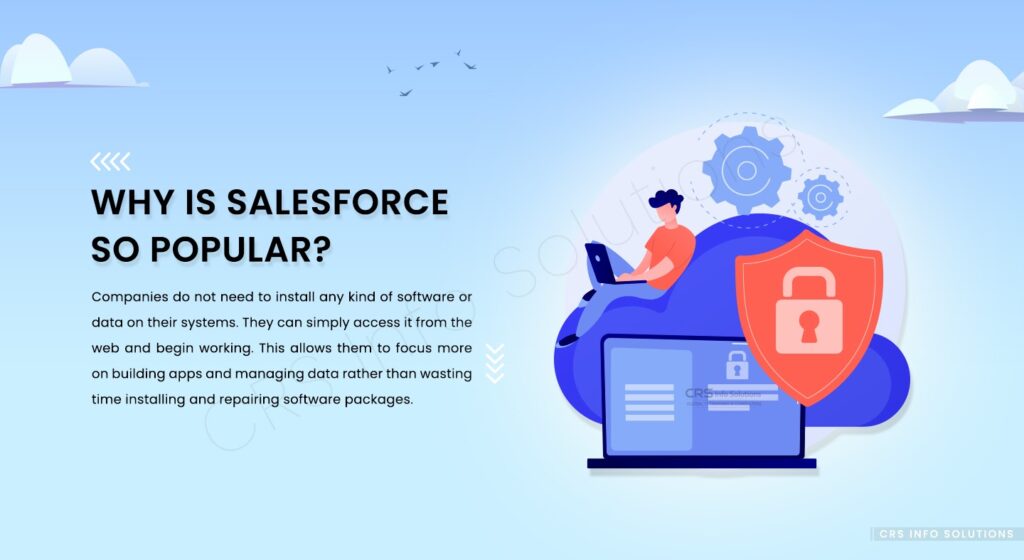
Salesforce is one of the best available commercial Customer Relationship Management (CRM) software. It provides a single shared view for each customer, for people working across various departments, such as sales, marketing, etc.
What exactly is Salesforce?
Salesforce is a powerful platform that helps businesses manage and enhance their relationships with customers by focusing on the most relevant areas of interaction. Offered as a SaaS (Software as a Service) solution, Salesforce eliminates the need for complex installations or dedicated server storage. Instead, users can simply sign up online and begin leveraging its tools right away.
Initially designed as a CRM (Customer Relationship Management) solution, Salesforce has now evolved into a versatile platform offering a wide range of services for users and developers. It enables businesses to identify market demands and deliver results efficiently, often reducing the time it takes to bring products or services to market.
At its core, Salesforce is built on two foundational pillars: Customer Relationship Management (CRM) and Cloud Computing, making it a flexible, scalable, and accessible solution for companies of all sizes.
History of Salesforce
Founded in 1999 by Marc Benioff, along with Parker Harris, Dave Moellenhoff, and Frank Dominguez, Salesforce introduced the groundbreaking concept of cloud-based CRM. This approach eliminated the need for costly on-premises infrastructure, making CRM accessible to businesses of all sizes.
Salesforce’s initial success led to its IPO in 2004, raising $110 million. Over the years, it expanded its offerings with tools like Salesforce Customer 360 and Digital 360 for Industries, catering to sectors such as healthcare, retail, and finance.
The company also adopted the 1-1-1 philanthropy model, donating 1% of its product, time, and resources to social causes. Today, Salesforce is not just a CRM platform—it’s a global ecosystem that redefines how businesses interact with their customers.
Customer Relationship Management (CRM) and Cloud Computing
CRM is software that helps businesses manage customer interactions by storing key information like contact details, purchase history, and communication records. It enables companies to deliver personalized experiences, resolve complaints efficiently, and optimize sales and marketing strategies. By centralizing customer data, CRM strengthens relationships and drives business growth.
while, Cloud computing allows businesses to store and access data remotely over the internet, eliminating the need for physical servers. This technology enhances collaboration by enabling employees to work on the same data in real-time, from anywhere. It boosts efficiency, reduces costs, and supports faster decision-making, making it indispensable in today’s digital landscape
Why is Salesforce so popular?

Salesforce’s widespread popularity stems from several reasons that make it a preferred CRM solution for businesses worldwide:
- No Installation or Maintenance Hassles
- Salesforce is entirely cloud-based, so businesses don’t need to install software or manage local data.
- Users can access the platform directly from the web, allowing them to focus on building apps and managing data without worrying about technical setups.
- Cloud-Based Collaboration
- Multiple departments can work on the same data simultaneously, ensuring seamless collaboration.
- This enhances efficiency by breaking down silos and improving team communication.
- Affordable and Flexible Plans
- Salesforce offers pricing plans that cater to businesses of all sizes, from startups to large enterprises.
- Its vast repository of features ensures that companies get excellent value for their investment.
- Third-Party Integrations
- Salesforce integrates seamlessly with popular apps like Gmail and Outlook, boosting productivity.
- This capability is a significant advantage over many other CRM tools that lack robust integration options.
- Ease of Use
- The platform’s intuitive interface makes it straightforward to use, even for non-technical users.
- It enables quick app deployment, delivering efficient and clean outputs as needed.
- Customizability
- Salesforce can be tailored to match a company’s specific preferences and workflows.
- Its flexibility reduces development costs while ensuring the software aligns perfectly with business requirements.
These advantages make Salesforce a versatile and reliable CRM solution, trusted by organizations across industries.
Opportunities and Growth in Salesforce
The Salesforce ecosystem offers abundant career opportunities and growth potential:
- In-Demand Roles: Jobs like Salesforce administrator, developer, and consultant are highly sought after.
- Certifications: Salesforce certifications validate expertise and enhance job prospects.
- Global Community: Join a vibrant network of professionals and gain insights through forums and events.
- Industry-Specific Solutions: Salesforce provides tailored solutions for healthcare, finance, and retail.
- Entrepreneurial Opportunities: Build apps or become a Salesforce partner through AppExchange.
With its growing adoption, Salesforce is shaping the future of CRM and offering promising careers worldwide.
What Makes Salesforce Stand Out from Other CRMs?
Salesforce distinguishes itself through innovation, adaptability, and a robust ecosystem. Here’s what sets it apart:
- Community Support: A global user base and active forums make Salesforce a collaborative platform.
- Cloud-Based Architecture: Accessible from anywhere, Salesforce eliminates the need for complex installations and hardware.
- Customization: With tools like Salesforce Lightning, businesses can tailor workflows and processes.
- Integration: Seamlessly connects with third-party apps and tools through AppExchange.
- AI-Powered Analytics: Einstein AI delivers predictive insights and automation to enhance decision-making.
What are the various technologies utilized by Salesforce?
Salesforce employs advanced technologies to empower developers and businesses to build efficient and scalable solutions. Here are the core technologies:
- Lightning Web Components (LWC): A modern framework that uses web standards like JavaScript, HTML, and CSS to build fast and reusable custom components for Salesforce applications.
- Apex: Salesforce’s native programming language used for backend development, including triggers, controllers, and batch processes.
- SOQL and SOSL: Query languages to retrieve and search data from Salesforce’s relational database.
- Einstein AI: A powerful AI engine that provides predictive analytics, automation, and insights for smarter decision-making.
- MuleSoft: An integration platform that connects Salesforce with external systems for seamless data synchronization and API development.
- Salesforce Flow: A low-code automation tool that allows admins to create workflows and complex business processes effortlessly.
- Heroku: A cloud platform for developing and scaling applications that integrate with Salesforce data.
These technologies make Salesforce a versatile, cutting-edge platform for businesses across industries.
Benefits of Using Salesforce
Adopting Salesforce offers significant advantages for businesses:
- Enhanced Customer Relationships: Gain a 360-degree view of customer interactions.
- Automation and Productivity: Streamline workflows and reduce manual tasks.
- Scalability: Salesforce grows with your business, accommodating changing needs.
- Integration: Easily connects with tools like MailChimp and QuickBooks.
- Real-Time Analytics: Provides actionable insights for quick decision-making.
These benefits make Salesforce indispensable for businesses aiming to scale and innovate in a competitive market.
Key Features of Salesforce
Salesforce’s features ensure businesses operate more efficiently. Some highlights include:
- Reports and Dashboards: Real-time analytics and customizable dashboards to track performance.
- Mobile Accessibility: The Salesforce mobile app ensures productivity on the go.
- Workflow Automation: Automate repetitive tasks with tools like Process Builder.
- Data Management: Keep customer data accurate and up-to-date with tools like Data.com Clean.
- Sales Forecasting: Advanced forecasting tools provide insights into sales pipelines.
- Collaboration Tools: Chatter allows teams to communicate and share files seamlessly.
Salesforce Products and Services
Salesforce’s product suite caters to various business needs:
- Sales Cloud: Manages leads, opportunities, and sales forecasting.
- Service Cloud: Enhances customer service with case management and knowledge bases.
- Marketing Cloud: Enables personalized campaigns through email, social media, and customer journeys.
- Commerce Cloud: Creates unified e-commerce experiences for businesses.
- Einstein Analytics: Provides AI-driven insights for better decision-making.
- Heroku: A cloud platform for developing and scaling applications.
These products collectively address sales, marketing, service, and development needs, making Salesforce a versatile CRM platform.
Frequently Asked Questions (FAQs)
1. What exactly is Salesforce used for?
Salesforce is a cloud-based customer relationship management (CRM) platform used by businesses to manage their sales, customer service, marketing, and other business operations. It provides tools for tracking customer interactions, managing leads and opportunities, automating workflows, and generating reports and dashboards. Salesforce helps businesses improve customer engagement, streamline operations, and enhance productivity by providing a comprehensive view of customer data and facilitating collaboration across teams.
2. Is Salesforce easy to learn?
Salesforce can be relatively easy to learn, especially with the wealth of resources available such as Trailhead, Salesforce’s free learning platform. Trailhead offers interactive, hands-on modules that cover a wide range of topics, from basic concepts to advanced functionalities. While the learning curve can vary depending on your background and experience, consistent practice and engagement with these resources can make learning Salesforce manageable and rewarding.
3. What is Salesforce easily explained?
Salesforce is a powerful, cloud-based CRM platform that helps businesses manage customer relationships and streamline their operations. It offers a suite of tools for sales, customer service, marketing, and more, all accessible through a web interface. Salesforce allows businesses to track customer interactions, manage sales pipelines, automate tasks, and generate insightful reports, ultimately improving efficiency and customer satisfaction.
4. What is Salesforce for beginners?
For beginners, Salesforce is a user-friendly CRM platform that provides essential tools for managing customer relationships and business processes. Beginners can start with the Salesforce Essentials Edition, which offers core features like contact management, task tracking, and basic reporting. Salesforce’s Trailhead platform provides guided learning paths, making it easy for beginners to learn how to use the system effectively and gradually build their skills.
5. Why Salesforce is so popular?
Salesforce is popular due to its comprehensive feature set, scalability, and flexibility. It provides a robust CRM platform that can be customized to meet the unique needs of any business, regardless of size or industry. Salesforce’s cloud-based architecture allows for easy access from anywhere, and its extensive ecosystem of third-party apps and integrations enhances its functionality. Additionally, Salesforce’s commitment to continuous innovation and customer success contributes to its widespread adoption.
6. What is the benefit of using Salesforce?
The primary benefit of using Salesforce is its ability to centralize and streamline business processes, improving efficiency and productivity. Salesforce offers tools for managing sales, customer service, marketing, and more, all within a single platform. It provides real-time insights through reports and dashboards, helping businesses make data-driven decisions. Salesforce also enhances collaboration across teams, improves customer engagement, and supports scalability, allowing businesses to grow and adapt easily.
7. Can I self learn Salesforce?
Yes, you can self-learn Salesforce using a variety of resources. Trailhead, Salesforce’s free learning platform, offers comprehensive, interactive modules that cover all aspects of Salesforce, from basic to advanced topics. Additionally, there are numerous online courses, tutorials, and forums available that can help you learn Salesforce at your own pace. Consistent practice and engagement with these resources will enable you to gain proficiency in Salesforce independently.
8. Can I learn Salesforce in 3 months?
Yes, it is possible to learn Salesforce in 3 months, especially if you dedicate consistent time and effort to your studies. Utilizing Trailhead, Salesforce’s interactive learning platform, you can follow structured learning paths that cover essential topics and provide hands-on practice. With regular study and practice, you can gain a solid understanding of Salesforce’s core functionalities and be prepared for certification within this timeframe.
9. Can I learn Salesforce in 2 weeks?
While it is challenging to learn Salesforce comprehensively in 2 weeks, you can gain a basic understanding of its core functionalities within this short period. Focus on the essential modules on Trailhead, such as Salesforce fundamentals, basic configuration, and user management. Although mastering Salesforce in 2 weeks is unlikely, this intensive study can provide a strong foundation for further learning and practice.
10. Can I get Salesforce job with no experience?
Yes, it is possible to get a Salesforce job with no prior experience, particularly at the entry level. Obtaining a Salesforce certification, such as the Salesforce Certified Administrator, can significantly enhance your job prospects. Gaining hands-on experience through Trailhead, volunteering, or working on personal projects can make you a more attractive candidate. Networking within the Salesforce community and leveraging online platforms can also help you find job opportunities.
11. Can I learn Salesforce without coding?
Yes, you can learn Salesforce without coding. Many Salesforce roles, such as Salesforce Administrator or Salesforce Business Analyst, primarily involve configuring the platform using declarative tools like Process Builder, Flow Builder, and point-and-click interfaces. These roles do not require coding skills. However, for development roles, knowledge of Apex (Salesforce’s programming language) and Lightning Web Components would be necessary.
12. How much does Salesforce cost?
The cost of Salesforce varies depending on the edition and features required. The Salesforce Essentials Edition starts at $25 per user per month, designed for small businesses. The Professional Edition costs $75 per user per month, offering more features for growing businesses. The Enterprise Edition is priced at $150 per user per month, suitable for larger organizations with advanced needs. The Unlimited Edition costs $300 per user per month, providing the most comprehensive features and support.
13. Can you learn Salesforce for free?
Yes, you can learn Salesforce for free using Trailhead, Salesforce’s interactive learning platform. Trailhead offers a wide range of modules, projects, and trails that cover all aspects of Salesforce, from basic to advanced topics. Additionally, Salesforce provides free Developer Edition accounts, allowing you to practice and experiment with the platform without any cost. These resources make it accessible to learn Salesforce independently.
14. How much does it cost to get Salesforce certified?
The cost of Salesforce certification varies depending on the certification level. The Salesforce Certified Administrator exam costs $200 per attempt. If you do not pass the exam on the first try, you can retake it for a reduced fee of $100 per retake. Advanced and specialized certifications may have different pricing, but the initial cost for most Salesforce certification exams is $200.
15. Are Salesforce exams free?
Salesforce exams are not free. Each certification exam typically costs $200 for the initial attempt and $100 for each retake. However, Salesforce occasionally offers vouchers or discounts through special promotions, events, or partnerships, which can reduce or waive the exam fee. Additionally, some employers may cover the cost of certification exams for their employees as part of professional development programs.
16. Can I learn Salesforce without a degree?
Yes, you can learn Salesforce without a degree. Many Salesforce professionals have successfully learned and built careers in Salesforce without holding a formal degree. What matters most is gaining the necessary skills and knowledge through resources like Trailhead, online courses, and hands-on practice. Obtaining Salesforce certifications can also validate your expertise and enhance your job prospects, regardless of whether you have a degree.
17. What is the best way to learn Salesforce?
The best way to learn Salesforce is through a combination of structured learning and hands-on practice. Start with Trailhead, Salesforce’s free learning platform, which offers interactive modules and guided learning paths. Supplement your learning with online courses, tutorials, and Salesforce’s official documentation. Practice using a Developer Edition account to apply what you’ve learned. Join Salesforce communities and forums to network, ask questions, and share knowledge. Consistent practice and engagement with these resources will help you master Salesforce effectively.
18. Is Salesforce certification difficult?
The difficulty of Salesforce certification exams depends on your preparation and familiarity with the platform. While the exams can be challenging due to the breadth of topics covered, they are manageable with thorough study and practice. Utilizing Trailhead, practice exams, and official study guides can significantly enhance your preparation. The key is to understand the concepts deeply and gain hands-on experience to confidently answer the exam questions.
19. Can a non-IT person learn Salesforce?
Yes, a non-IT person can learn Salesforce. this is designed to be user-friendly, and many of its features can be learned and utilized without a technical background. Roles such as Salesforce Administrator or Salesforce Business Analyst primarily involve configuring the platform using declarative tools, which do not require coding skills. With the help of Trailhead and other learning resources, non-IT individuals can acquire the necessary skills and knowledge to work effectively with Salesforce.
20. Can you take Salesforce certification online?
Yes, you can take Salesforce certification exams online. Salesforce offers the option to take exams through online proctoring, allowing you to complete the certification from the comfort of your home or office. You will need a reliable internet connection, a webcam, and a quiet, private environment to take the exam. Online proctoring ensures the integrity of the exam process while providing flexibility for candidates.
21. Is it easy to get Salesforce certification?
Getting a Salesforce certification requires preparation and dedication, but it is achievable with the right resources and effort. Utilizing Trailhead, practice exams, and official study guides can help you understand the material and prepare effectively. The exams test a wide range of topics, so thorough study and hands-on practice are essential. While it may not be easy, with consistent effort and proper preparation, you can successfully earn a certification.
Conclusion
Salesforce is one of the most versatile CRM software. The number of features that it boasts of can alone testify as a reason for that. Additionally, the easy-to-use interface and economical pricing ranges mean that any new startup or business can rely on this software to increase their customer base and market outreach.
All you need to do is be well versed in the various languages that Salesforce requires, and you will be able to create and execute almost any program or app as per your requirements.






Leave a Reply
You must be logged in to post a comment.